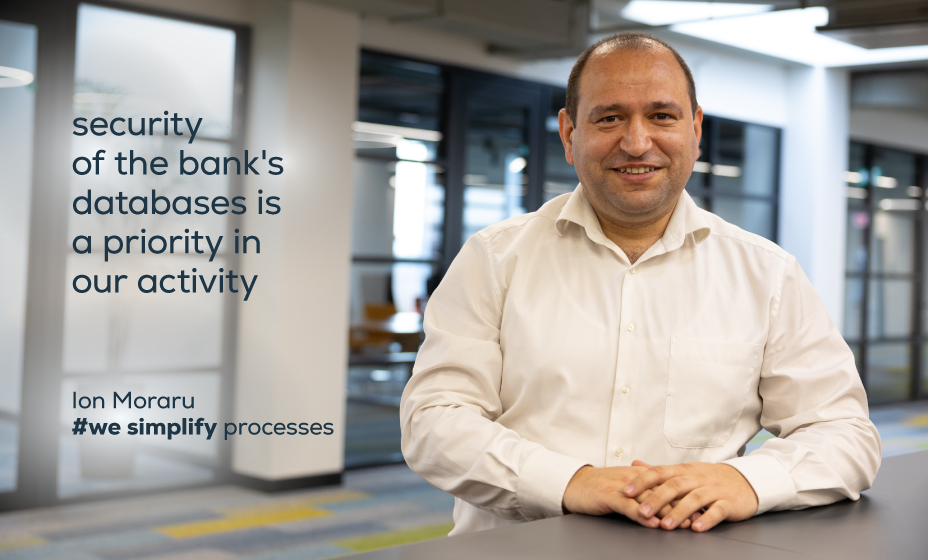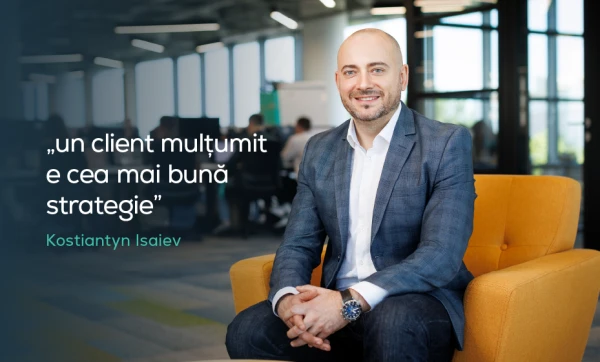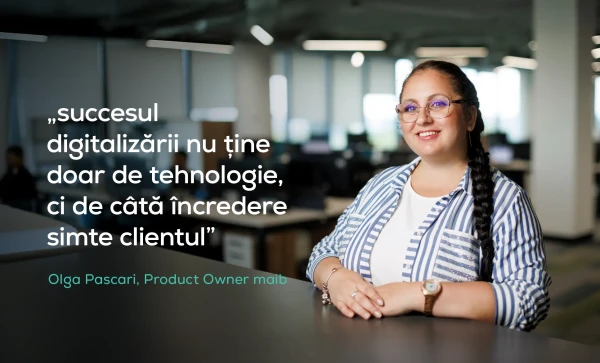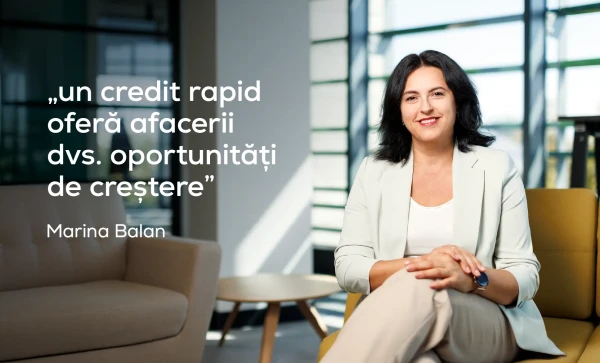Interview with Ion Moraru, Head of the Analytical Platforms Department at maib
Ion, hello. I guess you're used to the idea that for most people, the "Analytical Platforms Department", especially with the advent of artificial intelligence, is like a "black box" where something happens, but few understand what and how.
That's right, it happens frequently.
How would you explain what you do if you were talking to primary school pupils?
I always choose to present information in a visual format. I would tell them everything in the classroom: chairs, desks, notebooks, pens, textbooks - "this is data". The next step would be to try to do something with these objects and first understand for what purpose each was created. I would then go on to organise this chaos and study it. For example, a pen. Given its primary purpose, it will be essential for us to understand how much all the pens in the class can write, how many pages the ink will be enough for, and which pens are most efficient so that in the future, we can buy only such pens for the pupils.
I have a tricky question. Do you collect data on everything in the bank? Even the colour of my sweater?
As an analyst, I'm sure there is a link between the colour of customers' clothes and their decisions with the bank, for example, when they apply for a loan or open a deposit. It is possible to use this data to benefit customers in the future. But, of course, we do not use the information from surveillance cameras for analysis. Our working principles regarding the confidentiality of personal data are as ethical as possible. We, therefore, collect data from open sources and from a range of data created by the bank itself in the process.
Every activity has a purpose. What is the main purpose of data collection by a bank?
Maib is primarily customer-oriented. By analysing data, we aim to better understand the customer. Which product is more convenient for them when communicating on different topics? For example, it is better to remind him about loan repayment in the morning or evening to understand when they should receive this message. What are the best communication channels, a mobile app or a text message?
You are analysing dozens, if not hundreds, of parameters. Who selects the parameters to be entered into the database? Based on what principles?
A high level of uncertainty characterises the business environment, which increases over time as the systems around us become increasingly complex. Therefore, the fundamental principle of database management is to keep data for as long as possible, even if it is not always clear how this data can be used. In the future, the availability of specific data over a more extended period will become a competitive advantage or a way to meet a customer's demand more efficiently. This is why we build our database architecture on the Lakehouse principle. This allows us to store data whose purpose is known, turn it into values, and organise the storage of data that might be needed in the future.
Does the database include only automatically-collected data?
Not only. The results of a survey carried out by the Contact Center can be added to the database.
Does this mean that you are constantly adjusting the database's architecture so that it can always receive new information that has not been previously analysed?
Yes, we constantly adjust and update the database architecture to be able to receive new information. This is necessary because new data can arise anytime, and our system needs to be flexible and scalable. Our database architecture is built on the Lakehouse principle, which allows us to integrate new data and adapt to requirements efficiently. This approach helps us keep our data current and complete and respond quickly to new requests and opportunities that are needed for development and to meet the needs of our colleagues.
However, this never compromises the fundamental principle - the security and protection of personal data. The architecture is meticulously designed in such a way that, even within the bank, the employee processing the data remains unaware of whose data they are handling. Access is granted only to the manager serving that customer. Our internal protocols are stringent, maximising the protection and security of personal data against external and internal interference.
How many specialists in the Department work on these aspects?
12 people in three teams working together - Data Analyst, Data Engineer and Data Scientist.
Do you plan to expand your team? I'm asking, maybe this interview will help you find the specialists you need.
We are looking for a Data Scientist. But otherwise, we're doing well. This is due to the coherence we have developed in our work. Nearly 40% of the team we've built through our efforts. It has been a difficult period, but there has also been a growing mutual understanding in the team, a habit of sharing knowledge and exchanging experience.
What is your database experience?
I have been working since 2005. I started working with data when the analysis processes in banks were beginning. I've gained experience automating analytics and business processes in the bank, so now it's easy for me to communicate with specialists in any field: product developers, technicians, and operational employees.
I once read the phrase: "In business there should be no one person". I am referring to the fact that important processes cannot be entrusted to one person. How do you manage this situation in such a small team?
I start with myself - I do as much research as possible and share my knowledge and experience so that the team can work productively even when I'm away for a while or so that the person replacing me understands how the whole process is organised. But it's not just me, it's all of us. We have implemented interchangeability processes, exchanged knowledge, and run internal workshops as a team. This collaborative approach helps us organise ourselves efficiently and discuss things before we start solving a task.
As part of our commitment to talent development, I actively participate in projects to attract and nurture new professionals. Through initiatives like the Dual Academy, internships, and data analyst courses, where I serve as a trainer, we aim to identify and cultivate the potential of young professionals. These efforts not only help us identify future valuable professionals, but also enrich our team with exceptional new colleagues, fostering a dynamic and innovative organisational culture, a key success factor in the field of data analysis at maib.
For example, TUM recently hosted a database management competition. I developed the topic of consumer loans and was the Chair of the jury.
What are the priorities for 2024?
One priority is to complete the process of defining key metrics, such as customer profitability, product profitability, and process profitability so that bank management can build development models based on data rather than assumptions.
We want to develop several aspects of the business related to artificial intelligence. We have already launched an internal chatbot that automatically answers some questions, making the work of Contact Center employees faster and more efficient.
We will also move towards cloud computing and innovative database architecture, where conventionally, it is possible to store any data without architectural requirements, store it in any order, but keep it able to process it efficiently.
Is it like a child throwing things all over the house and finding them immediately when needed?
In simple terms, that's how it is. The chaos of storing data makes it faster and easier to accumulate it while the system knows how to process it.
I think that in the future, the importance of data and the complexity of processing it will increase so much that a whole series of simple examples will be needed to explain how it works..
One of the priorities for both 2024 and the long term is not to overload the system and to identify the best solutions according to the complexity of the data.


 maibank
maibank
 maib business app
maib business app
 online loans – legal entities
online loans – legal entities
 internet banking - individuals
internet banking - individuals
 new internet banking - maib business
new internet banking - maib business
 internet Banking - BankFlex
internet Banking - BankFlex




